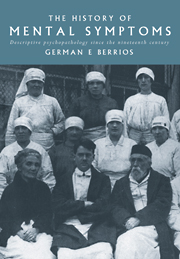Book contents
- Frontmatter
- Contents
- PREFACE
- ACKNOWLEDGEMENTS
- INTRODUCTION
- PART I The object of inquiry
- PART II Cognition and consciousness
- CHAPTER 3 Disorders of perception
- CHAPTER 4 Thought disorder
- CHAPTER 5 Delusions
- CHAPTER 6 Obsessions and compulsions
- CHAPTER 7 Mental Retardation
- CHAPTER 8 Cognitive impairment
- CHAPTER 9 Memory and its disorders
- CHAPTER 10 Consciousness and its disorders
- PART III Mood and emotions
- PART IV Volition and action
- PART V Miscellany
- REFERENCES
- NAME INDEX
- SUBJECT INDEX
CHAPTER 9 - Memory and its disorders
from PART II - Cognition and consciousness
Published online by Cambridge University Press: 08 January 2010
- Frontmatter
- Contents
- PREFACE
- ACKNOWLEDGEMENTS
- INTRODUCTION
- PART I The object of inquiry
- PART II Cognition and consciousness
- CHAPTER 3 Disorders of perception
- CHAPTER 4 Thought disorder
- CHAPTER 5 Delusions
- CHAPTER 6 Obsessions and compulsions
- CHAPTER 7 Mental Retardation
- CHAPTER 8 Cognitive impairment
- CHAPTER 9 Memory and its disorders
- CHAPTER 10 Consciousness and its disorders
- PART III Mood and emotions
- PART IV Volition and action
- PART V Miscellany
- REFERENCES
- NAME INDEX
- SUBJECT INDEX
Summary
The historical analysis of the memory disorders must borrow from areas as wide apart as the history of neuropsychiatry, philosophy and psychology. Indeed, the decision of whether clinical phenomena such as dèjd vu, fugues, confabulations or ‘delusions of memory’ are mnestic disturbances cannot be determined by empirical research alone and requires preparatory conceptual analysis. Historical research may also inform us whether models of memory analogous to current ones have already been proposed in the past, and to what extent they have also been inspired on the mnestic vicissitudes of few famous patients. This chapter will only scan what remains an uncharted territory.
Pre-nineteenth century issues
From earlier times, man's ability to retain, retrieve, or lose information whether about himself or the world has been motive of wonder, fear and much speculation. Since the Classical period two memory ‘stages’ or ‘capacities’ have been identified: conservation and retrieval. The analysis of conservation was governed by ‘spatial’ metaphors (pertaining to storage spaces and containers) and these were easily retranslated into the current ‘somatic’ or ‘organic’ accounts. Retrieval mechanisms, on the other hand, were analysed in the temporal dimension or as Aristotle put it, they are ‘always accompanied by time’; the guiding metaphors in this case were ‘searching’ and ‘finding’ and the ensuing models alluded to functions such as cataloguing, dating, and recognizing information. Since the time of Aristotle, interest on memory has oscillated between these two perspectives. References to ‘memory’ can be found in early documents including the Old Testament, the Talmud, and Plato's work, but there is agreement that Aristotle set the framework in relation to which the philosophy of memory has been discussed ever since.
- Type
- Chapter
- Information
- The History of Mental SymptomsDescriptive Psychopathology since the Nineteenth Century, pp. 208 - 228Publisher: Cambridge University PressPrint publication year: 1996



